#disability information
Explore tagged Tumblr posts
Text
As a semi-regular cane user this is VERY good.
I'll also second that quite a few of us have multiple canes for multiple occasions. I have three adjustible canes, and one wooden one, and I have a favourite out of all of those and get a little sad when I can't use it. (Switch Sticks are amazing).
Even adjustible canes don't always adjust to the exact right height you need, and if you've been using a cane for a long time and suddenly have to change into a different brand or make (or just want to make a different fashion statement), you can feel that centimetre of difference!
Because I don't need the cane 24/7, I often like adjustible so I can fold it in half while tackling stairs (for me stairs are easier to just take one at a time, currently). I get really angry with a handbag hanging off one shoulder, so I need a big strap so it can go around both shoulders and won't keep sliding off my arm while I'm using the cane. Sometimes it's very inconvenient to be shopping with a cane and a handbag and want to grab something at the same time.
Also if you're clumsy, you will still accidentally hit yourself (or others) with the cane while you're walking! And my favourite - when you step on the rubber stopper and it comes off and then you have to put it on again.
Finally I have hEDS, rheumatoid arthritis, and other joint issues, including RSI in both wrists, so even with good posture and gait and oversight by a physiotherapist, I still get wrist issues and elbow issues simply from long-term use. They're minor and treatable, but they can still happen if you have other joint issues.
Also, people are often terribly ableist towards younger people with canes, at least where I live (Western Australia). I started needing to intermittently use a walking stick when I was around 21, and noticed that on public transport other folks would stand for people in wheelchairs, pregnant folks, elderly folks and basically *anyone other than the younger person with a cane.* It is really quite incredible how dismissed folks are with walking sticks. It might be slightly better now.
It amuses me when people are like 'a person wouldn't use their cane as a weapon.' Yes, some of us would. Not all of us have the same kind of issues re: using a pain, and some of us have *very* good one-leg balance. I 100% believe in using my cane as a weapon in exchange for causing more pain through that leg. This wouldn't work for anyone who has a major instability issue, but as OP pointed out, anyone who needs more than 20% weight-bearing will likely be using something different (or causing themselves massive arm/joint/shoulder/spine problems until they realise they need to be using something different).
The only thing is I can't run and use a cane as a weapon, or walk quickly and do it. So I'll have to stand and swing that fucker into someone's face should I ever be threatened or have to stop someone else from being hurt. Also given how often I trip myself and other people with it by accident, I imagine it's very good for this too. e.e
As a writer I fully prepare to take advantage of this one day, lmao.
A general cane guide for writers and artists (from a cane user, writer, and artist!)
Disclaimer: Though I have been using a cane for 6 years, I am not a doctor, nor am I by any means an expert. This guide is true to my experience, but there are as many ways to use a cane as there are cane users!
This guide will not include: White canes for blindness, crutches, walkers, or wheelchairs as I have no personal experience with these.
This is meant to be a general guide to get you started and avoid some common mishaps/misconceptions, but you absolutely should continue to do your own research outside of this guide!
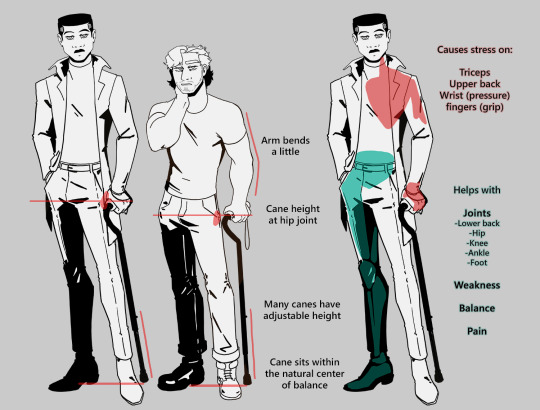
The biggest recurring problem I've seen is using the cane on the wrong side. The cane goes on the opposite side of the pain! If your character has even-sided pain or needs it for balance/weakness, then use the cane in the non-dominant hand to keep the dominant hand free. Some cane users also switch sides to give their arm a rest!
A cane takes about 20% of your weight off the opposite leg. It should fit within your natural gait and become something of an extension of your body. If you need more weight off than 20%, then crutches, a walker, or a wheelchair is needed.
Putting more pressure on the cane, using it on the wrong side, or having it at the wrong height will make it less effective, and can cause long term damage to your body from improper pressure and posture. (Hugh Laurie genuinely hurt his body from years of using a cane wrong on House!)
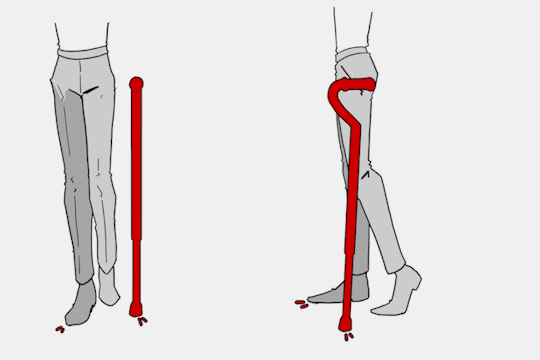
(an animated GIF of a cane matching the natural walking gait. It turns red when pressure is placed on it.)
When going up and down stairs, there is an ideal standard: You want to use the handrail and the cane at the same time, or prioritize the handrail if it's only on one side. When going up stairs you lead with your good leg and follow with the cane and hurt leg together. When going down stairs you lead with the cane, then the good leg, and THEN the leg that needs help.
Realistically though, many people don't move out of the way for cane users to access the railing, many stairs don't have railings, and many are wet, rusty, or generally not ideal to grip.
In these cases, if you have a friend nearby, holding on to them is a good idea. Or, take it one step at a time carefully if you're alone.
Now we come to a very common mistake I see... Using fashion canes for medical use!
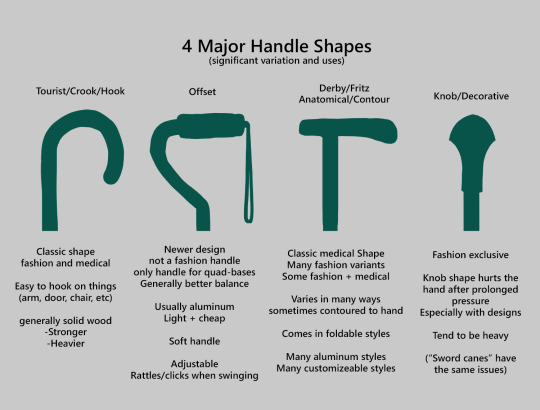
(These are 4 broad shapes, but there is INCREDIBLE variation in cane handles. Research heavily what will be best for your character's specific needs!)
The handle is the contact point for all the weight you're putting on your cane, and that pressure is being put onto your hand, wrist, and shoulder. So the shape is very important for long term use!
Knob handles (and very decorative handles) are not used for medical use for this reason. It adds extra stress to the body and can damage your hand to put constant pressure onto these painful shapes.
The weight of a cane is also incredibly important, as a heavier cane will cause wear on your body much faster. When you're using it all day, it gets heavy fast! If your character struggles with weakness, then they won't want a heavy cane if they can help it!
This is also part of why sword canes aren't usually very viable for medical use (along with them usually being knob handles) is that swords are extra weight!
However, a small knife or perhaps a retractable blade hidden within the base might be viable even for weak characters.
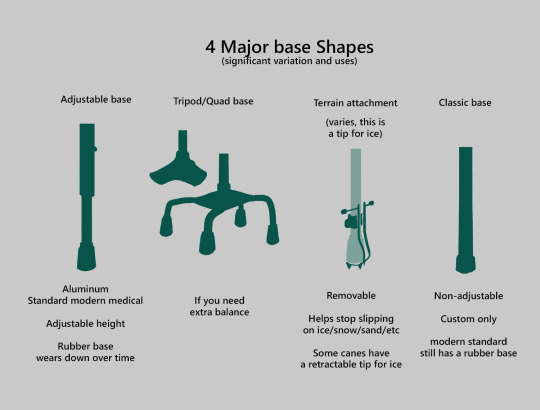
Bases have a lot of variability as well, and the modern standard is generally adjustable bases. Adjustable canes are very handy if your character regularly changes shoe height, for instance (gotta keep the height at your hip!)
Canes help on most terrain with their standard base and structure. But for some terrain, you might want a different base, or to forego the cane entirely! This article covers it pretty well.
Many cane users decorate their canes! Stickers are incredibly common, and painting canes is relatively common as well! You'll also see people replacing the standard wrist strap with a personalized one, or even adding a small charm to the ring the strap connects to. (nothing too large, or it gets annoying as the cane is swinging around everywhere)
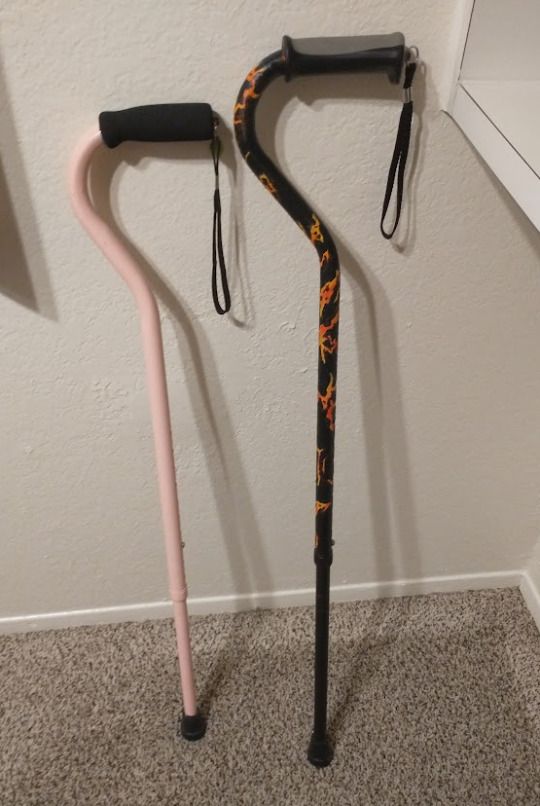
(my canes, for reference)
If your character uses a cane full time, then they might also have multiple canes that look different aesthetically to match their outfits!
When it comes to practical things outside of the cane, you reasonably only have one hand available while it's being used. Many people will hook their cane onto their arm or let it dangle on the strap (if they have one) while using their cane arm, but it's often significantly less convenient than 2 hands. But, if you need 2 hands, then it's either setting the cane down or letting it hang!
For this reason, optimizing one handed use is ideal! Keeping bags/items on the side of your free hand helps keep your items accessible.
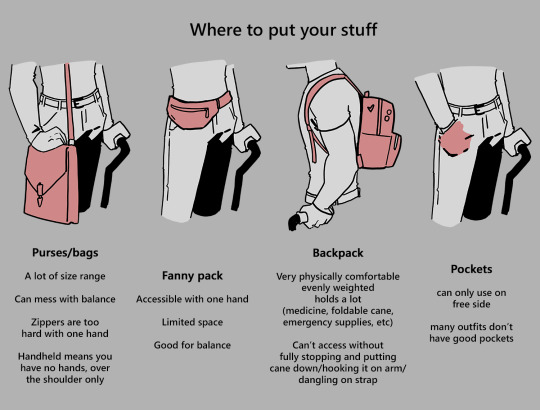
When sitting, the cane either leans against a wall or table, goes under the chair, or hooks onto the back of the chair. (It often falls when hanging off of a chair, in my experience)
When getting up, the user will either use their cane to help them balance/support as they stand, or get up and then grab their cane. This depends on what it's being used for (balance vs pain when walking, for instance!)
That's everything I can think of for now. Thank you for reading my long-but-absolutely-not-comprehensive list of things to keep in mind when writing or drawing a cane user!
Happy disability pride month! Go forth and make more characters use canes!!!
#asks and answers#disability#disability information#mobility aid#mobility aids#walking sticks#cane#the rubber stopper keeps coming off my wooden cane#also you can often get *extremely cheap adjustible black canes* from#disability wholesalers sdalkfajs#i remember all the pharmacies were charging a lot when I needed my first one#and I was a poor university student at the time#went into an industrial area with a disability aid wholesaler#got my first adjustible cane for like $15 and I still use it#obviously inflation but sdklafjsa#oh and you can order things off the internet now which you couldn't back then lmao#or at least not as easily
91K notes
·
View notes
Text
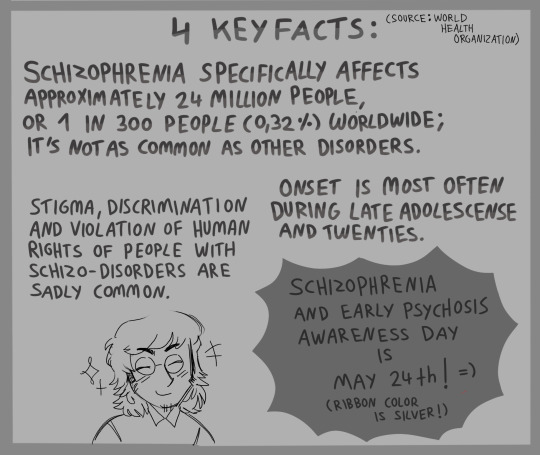
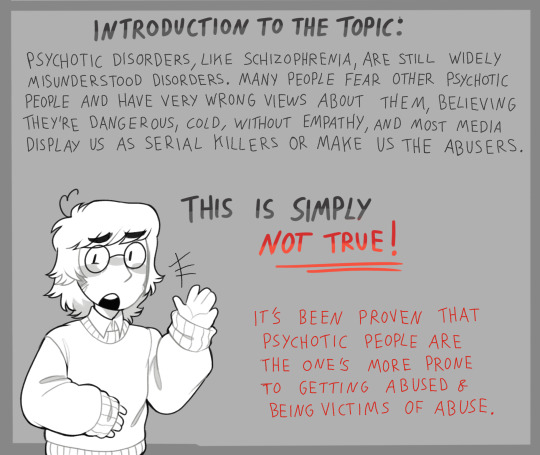
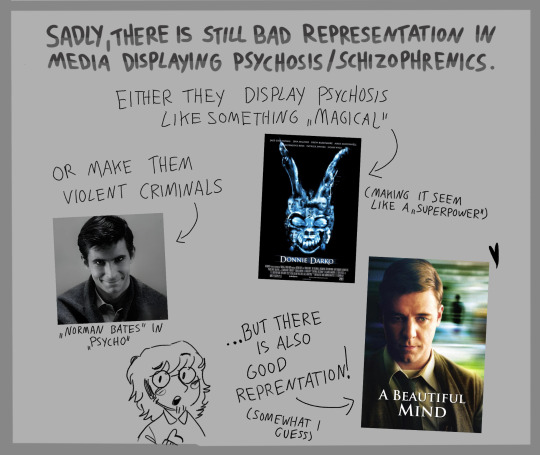

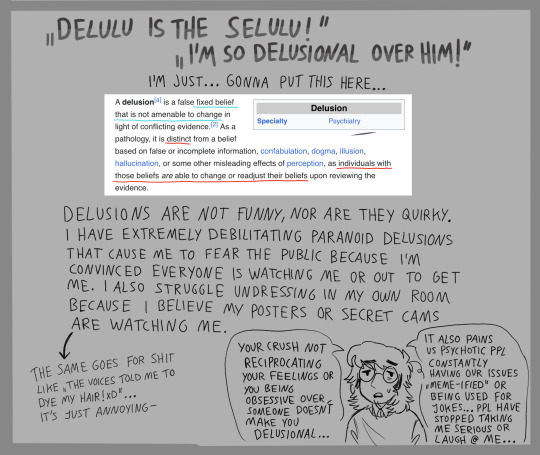

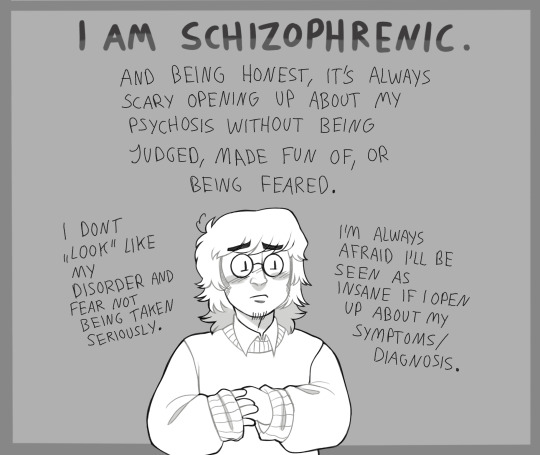
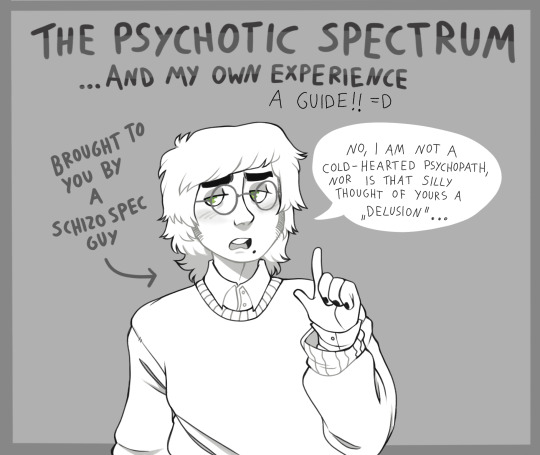
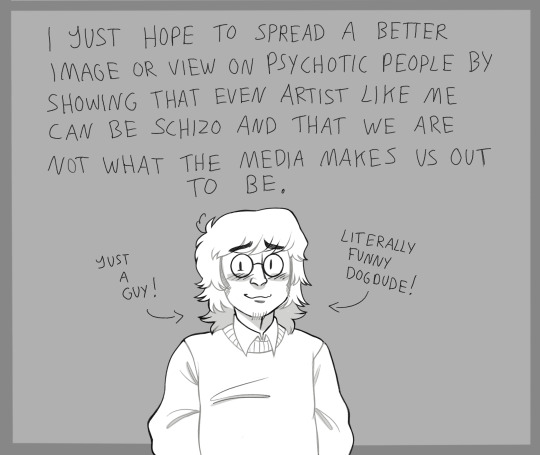
Here I am, posting something similar like the fibro post... this one goes out to my psychotic folks🫶
#mental illness#mental health#actually mentally ill#actuallt schizophrenic#schizoaffective#schizophrenia#schizospec#psychosis#actually psychotic#psychotic#schizophrenic#schizoaffective disorder#schizophreniform#schizotypal personality disorder#schizoid personality disorder#schizoid#hidden disability#invisible disability#invisible illness#delusion#hallucinations#information#infographic#info post#education#disorder#personality disorder#bpd#borderline personality disorder#bipolar
8K notes
·
View notes
Text
Still not over the head of cardiology, who said she wouldn't formally diagnose me with dysautonomia because she didn't want me to think of myself as disabled.
As if good vibes and a can-do attitude can stabalize autonomic dysfunction.
#chronic health tag#ableism in our medical system???#it's more likely than you think#I still remember having to inform the ER doctor that the reason MCAS wasn't in my file#was because the head of allergy for the hospital he worked at#'didn't believe in it'#this was one week into the pandemic#and this man touched his face out of exasperation#and muttered something that might have been 'dense mother fucker' under his breathe#anyway#there should be a screening process for people who want to go into medicine#if you think the only disability is a bad attitude#you should be jettisoned from your course and directly into the sun
5K notes
·
View notes
Text
Friendly reminder that all emergency pull cords must touch the floor. This does not mean tied up or resting on something or a foot off of the floor. In the United States, the cord must be within 2-6 inches off of the floor, but the best length is 2 inches from the floor.
These pull cords are also much easier to see if they are red and are less likely to be pulled out of curiosity when they are red.
#informative#information#chronic illness#disabled#chronic disability#chronically ill#chronic disease#chronicpain#other chronic illness bs#disability#disablity#disabilities#disability advocacy#physically disabled#actually disabled#disability rights#invisible disability#chronic disorder#chronic fatigue#chronic pain#wheelchair user#wheelchair#cpunk#angry cripple#cripple life#cripple problems#cripple punk#cripplepunk
348 notes
·
View notes
Text
I know this is not the point of the post, but I feel it is in the spirit of the post. I think this information is very helpful if to know if you have sort disability that may cause a problem in you safely evacuating a building.
Like for example I have asthma and I have PTSD.
I can imagine for diffrent reasons how depending on the situation those things may cause me problems in terms of safely evacuating a building.
Like if I'm trying to evacuate from a very high level floor at some point I may start to have issues because of asthma.
Or depending on the day and how I'm doing the alarms, the people rushing, the feeling of being trapped, the loud sounds, etc may cause me to start experiencing an anxiety or panic attack because of PTSD.
Knowing the information about I'm supposed to do, which this post explains but in the context of a diffrent situation is very reassuring and helpful.
I can imagine that for people who might have concerns like me in regards of what to do because their own disabilities and/or neurodivergence having this information is reassuring.
Wait what's a buildings fire evacuation plan if you aren't supposed to use the elevator to get down
266K notes
·
View notes
Text


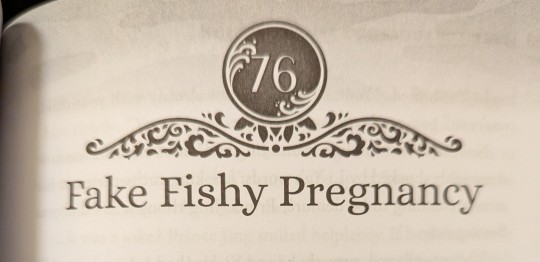
@fluffypurpleglitterdemon hey. hey. i just want to talk.
#i say this with complete affection but also i am a page and a half into this chapter#what in gods name am i reading#bene speaks#dtbpf#dtbpf spoilers#disabled tyrant's beloved pet fish spoilers#I GUESS prince jing is actively learning a net negative amount of information right now and so are you#li yu is the DUMBEST motherfucker to ever exist#i was not expecting the most patently unbelievable fake fish mpreg but like. maybe that's on me.#prince jing please don't buy into this nonsense quite so easily i beg you at least one of you needs a functional brain#anyway i am almost finished book two and will be having a very hard time waiting for book three this series is honestly too funny#thank god it comes out in december i need to decide what i'll be reading in the meantime...
165 notes
·
View notes
Text
I'm soooooo tired of living like this I need competent medical care I NEED CARE. HELLO????? I'M SO FUCKING TIRED!!!!!!!!! SCREAM
#sick#literally my friends and loved ones are the only people who have ever done anything for me illnesswise.#it's like a very small number of doctors will occasionally give me a small piece of information that is helpful#but RARELY. LIKE EVERY FIVE YEARS. AND USUALLY BY ACCIDENT.#GOD THE MEDICAL SYSTEM IS FUCKED! ITS UTTERLY FUCKED.#being chronically ill and disabled SUCKS SO BAD AND IT WOULDNT HAVE YO#ITS ALL THE RESULT OF THE WAY THE WORLD IS. LIKE#its INSANE how are we not all TOTALLY INSANE#i myself am only MODERATELY INSANE and i have NO IDEA how#frankly i would have been justified in goong off the deep end decades ago
114 notes
·
View notes
Text
The Disability Library
I love books, I love literature, and I love this blog, but it's only been recently that I've really been given the option to explore disabled literature, and I hate that. When I was a kid, all I wanted was to be able to read about characters like me, and now as an adult, all I want is to be able to read a book that takes us seriously.
And so, friends, Romans, countrymen, I present, a special disability and chronic illness booklist, compiled by myself and through the contributions of wonderful members from this site!
As always, if there are any at all that you want me to add, please just say. I'm always looking for more!
Edit 20/10/2023: You can now suggest books using the google form at the bottom!
Updated: 31/08/2023
Articles and Chapters
The Drifting Language of Architectural Accessibility in Victor Hugo's Notre-Dame de Paris, Essaka Joshua, 2012
Early Modern Literature and Disability Studies, Allison P. Hobgood, David Houston Wood, 2017
How Do You Develop Whole Object Relations as an Adult?, Elinor Greenburg, 2019
Making Do with What You Don't Have: Disabled Black Motherhood in Octavia E. Butler's Parable of the Sower and Parable of the Talents, Anna Hinton, 2018
Necropolitics, Achille Mbeme, 2003 OR Necropolitics, Achille Mbeme, 2019
Wasted Lives: Modernity and Its Outcasts, Zygmunt Bauman, 2004
Witchcraft and deformity in early modern English Literature, Scott Eaton, 2020
Books
Fiction:
Misc:
10 Things I Can See From Here, Carrie Mac
A-F:
A Curse So Dark and Lonely, (Series), Brigid Kemmerer
Akata Witch, (Series), Nnedi Okorafor
A Mango-Shaped Space, Wendy Mass
Ancillary Justice, (Series), Ann Leckie
An Unkindness of Ghosts, Rivers Solomon
An Unseen Attraction, (Series), K. J. Charles
A Shot in the Dark, Victoria Lee
A Snicker of Magic, Natalie Lloyd
A Song of Ice and Fire, (series), George R. R. Martin
A Spindle Splintered, (Series), Alix E. Harrow
A Time to Dance, Padma Venkatraman
Bath Haus, P. J. Vernon
Beasts of Prey, (Series), Ayana Gray
The Bedlam Stacks, (Series), Natasha Pulley
Black Bird, Blue Road, Sofiya Pasternack
Black Sun, (Series), Rebecca Roanhorse
Blood Price, (Series), Tanya Huff
Borderline, (Series), Mishell Baker
Breath, Donna Jo Napoli
The Broken Kingdoms, (Series), N.K. Jemisin
Brute, Kim Fielding
Cafe con Lychee, Emery Lee
Carry the Ocean, (Series), Heidi Cullinan
Challenger Deep, Neal Shusterman
Cinder, (Series), Marissa Meyer
Clean, Amy Reed
Connection Error, (Series), Annabeth Albert
Cosima Unfortunate Steals A Star, Laura Noakes
Crazy, Benjamin Lebert
Crooked Kingdom, (Series), Leigh Bardugo
Daniel Cabot Puts Down Roots, (Series), Cat Sebastian
Daniel, Deconstructed, James Ramos
Dead in the Garden, (Series), Dahlia Donovan
Dear Fang, With Love, Rufi Thorpe
Deathless Divide, (Series), Justina Ireland
The Degenerates, J. Albert Mann
The Doctor's Discretion, E.E. Ottoman
Earth Girl, (Series), Janet Edwards
Everyone in This Room Will Someday Be Dead, Emily R. Austin
The Extraordinaries, (Series), T. J. Klune
The Extraordinary Education of Nicholas Benedict, (Series), Trenton Lee Stewart
Fight + Flight, Jules Machias
The Final Girl Support Group, Grady Hendrix
Finding My Voice, (Series), Aoife Dooley
The First Thing About You, Chaz Hayden
Follow My Leader, James B. Garfield
Forever Is Now, Mariama J. Lockington
Fortune Favours the Dead, (Series), Stephen Spotswood
Fresh, Margot Wood
H-0:
Harmony, London Price
Harrow the Ninth, (series), Tamsyn Muir
Hench, (Series), Natalia Zina Walschots
Highly Illogical Behaviour, John Corey Whaley
Honey Girl, Morgan Rogers
How to Become a Planet, Nicole Melleby
How to Bite Your Neighbor and Win a Wager, (Series), D. N. Bryn
How to Sell Your Blood & Fall in Love, (Series), D. N. Bryn
Hunger Pangs: True Love Bites, Joy Demorra
I Am Not Alone, Francisco X. Stork
The Immeasurable Depth of You, Maria Ingrande Mora
In the Ring, Sierra Isley
Into The Drowning Deep, (Series), Mira Grant
Iron Widow, (Series), Xiran Jay Zhao
Izzy at the End of the World, K. A. Reynolds
Jodie's Journey, Colin Thiele
Just by Looking at Him, Ryan O'Connell
Kissing Doorknobs, Terry Spencer Hesser
Lakelore, Anna-Marie McLemore
Learning Curves, (Series), Ceillie Simkiss
Let's Call It a Doomsday, Katie Henry
The Library of the Dead, (Series), TL Huchu
The Lion Hunter, (Series), Elizabeth Wein
Lirael, (Series), Garth Nix
Long Macchiatos and Monsters, Alison Evans
Love from A to Z, (Series), S.K. Ali
Lycanthropy and Other Chronic Illnesses, Kristen O'Neal
Never Let Me Go, Kazuo Ishiguro
The Never Tilting World, (Series), Rin Chupeco
The No-Girlfriend Rule, Christen Randall
Nona the Ninth, (series), Tamsyn Muir
Noor, Nnedi Okorafor
Odder Still, (Series), D. N. Bryn
Once Stolen, (Series), D. N. Bryn
One For All, Lillie Lainoff
On the Edge of Gone, Corinne Duyvis
Origami Striptease, Peggy Munson
Our Bloody Pearl, (Series), D. N. Bryn
Out of My Mind, Sharon M. Draper
P-T:
Parable of the Sower, (Series), Octavia E. Butler
Parable of the Talents, (Series), Octavia E. Butler
Percy Jackson & the Olympians, (series), Rick Riordan
Pomegranate, Helen Elaine Lee
The Prey of Gods, Nicky Drayden
The Pursuit Of..., (Series), Courtney Milan
The Queen's Thief, (Series), Megan Whalen Turner
The Quiet and the Loud, Helena Fox
The Raging Quiet, Sheryl Jordan
The Reanimator's Heart, (Series), Kara Jorgensen
The Remaking of Corbin Wale, Joan Parrish
Roll with It, (Series), Jamie Sumner
Russian Doll, (Series), Cristelle Comby
The Second Mango, (Series), Shira Glassman
Scar of the Bamboo Leaf, Sieni A.M
Shaman, (Series), Noah Gordon
Sick Kids in Love, Hannah Moskowitz
The Silent Boy, Lois Lowry
Six of Crows, (Series) Leigh Bardugo
Sizzle Reel, Carlyn Greenwald
The Spare Man, Mary Robinette Kowal
The Stagsblood Prince, (Series), Gideon E. Wood
Stake Sauce, Arc 1: The Secret Ingredient is Love. No, Really, (Series), RoAnna Sylver
Stars in Your Eyes, Kacen Callender [Expected release: Oct 2023]
The Storm Runner, (Series), J. C. Cervantes
Stronger Still, (Series), D. N. Bryn
Sweetblood, Pete Hautman
Tarnished Are the Stars, Rosiee Thor
The Theft of Sunlight, (Series), Intisar Khanani
Throwaway Girls, Andrea Contos
Top Ten, Katie Cotugno
Torch, Lyn Miller-Lachmann
Treasure, Rebekah Weatherspoon
Turtles All the Way Down, John Green
U-Z:
Unlicensed Delivery, Will Soulsby-McCreath Expected release October 2023
Verona Comics, Jennifer Dugan
Vorkosigan Saga, (Series), Lois McMaster Bujold
We Are the Ants, (Series), Shaun David Hutchinson
The Weight of Our Sky, Hanna Alkaf
Whip, Stir and Serve, Caitlyn Frost and Henry Drake
The Whispering Dark, Kelly Andrew
Wicked Sweet, Chelsea M. Cameron
Wonder, (Series), R. J. Palacio
Wrong to Need You, (Series), Alisha Rai
Ziggy, Stardust and Me, James Brandon
Graphic Novels:
A Quick & Easy Guide to Sex & Disability, (Non-Fiction), A. Andrews
Constellations, Kate Glasheen
Dancing After TEN: a graphic memoir, (memoir) (Non-Fiction), Vivian Chong, Georgia Webber
Everything Is an Emergency: An OCD Story in Words Pictures, (memoir) (Non-Fiction), Jason Adam Katzenstein
Frankie's World: A Graphic Novel, (Series), Aoife Dooley
The Golden Hour, Niki Smith
Nimona, N. D. Stevenson
The Third Person, (memoir) (Non-Fiction), Emma Grove
Magazines and Anthologies:
Artificial Divide, (Anthology), Robert Kingett, Randy Lacey
Beneath Ceaseless Skies #175: Grandmother-nai-Leylit's Cloth of Winds, (Article), R. B. Lemburg
Defying Doomsday, (Anthology), edited by Tsana Dolichva and Holly Kench
Josee, the Tiger and the Fish, (short story) (anthology), Seiko Tanabe
Nothing Without Us, edited by Cait Gordon and Talia C. Johnson
Nothing Without Us Too, edited by Cait Gordon and Talia C. Johnson
Unbroken: 13 Stories Starring Disabled Teens, (Anthology), edited by Marieke Nijkamp
Uncanny #24: Disabled People Destroy Science Fiction, (Anthology), edited by: Elsa Sjunneson-Henry, Dominik Parisien et al.
Uncanny #30: Disabled People Destroy Fantasy, (Anthology), edited by: Nicolette Barischoff, Lisa M. Bradley, Katharine Duckett
We Shall Be Monsters, edited by Derek Newman-Stille
Manga:
Perfect World, (Series), Rie Aruga
The Sky is Blue with a Single Cloud, (Short Stories), Kuniko Tsurita
Non-Fiction:
Academic Ableism: Disability and Higher Education, Jay Timothy Dolmage
A Disability History of the United States, Kim E, Nielsen
The Architecture of Disability: Buildings, Cities, and Landscapes beyond Access, David Gissen
Being Seen: One Deafblind Woman's Fight to End Ableism, Elsa Sjunneson
Black Disability Politics, Sami Schalk
Borderline, Narcissistic, and Schizoid Adaptations: The Pursuit of Love, Admiration, and Safety, Dr. Elinor Greenburg
Brilliant Imperfection: Grappling with Cure, Eli Clare
The Cambridge Companion to Literature and Disability, Barker, Clare and Stuart Murray, editors.
The Capacity Contract: Intellectual Disability and the Question of Citizenship, Stacy Clifford Simplican
Capitalism and Disability, Martha Russel
Care work: Dreaming Disability Justice, Leah Lakshmi Piepzna-Samarasinha
Catatonia, Shutdown and Breakdown in Autism: A Psycho-Ecological Approach, Dr Amitta Shah
The Collected Schizophrenias: Essays, Esme Weijun Wang
Crip Kinship, Shayda Kafai
Crip Up the Kitchen: Tools, Tips and Recipes for the Disabled Cook, Jules Sherred
Culture – Theory – Disability: Encounters between Disability Studies and Cultural Studies, Anne Waldschmidt, Hanjo Berressem, Moritz Ingwersen
Decarcerating Disability: Deinstitutionalization and Prison Abolition, Liat Ben-Moshe
Demystifying Disability: What to Know, What to Say, and How to Be an Ally, Emily Ladau
Dirty River: A Queer Femme of Color Dreaming Her Way Home, Leah Lakshmi Piepzna-Samarasinha
Disability Pride: Dispatches from a Post-ADA World, Ben Mattlin
Disability Visibility: First-Person Stories From the Twenty-First Century, Alice Wong
Disfigured: On Fairy Tales, Disability and Making Space, Amanda Leduc
Every Cripple a Superhero, Christoph Keller
Exile and Pride: Disability, Queerness and Liberation, Eli Clare
Feminist Queer Crip, Alison Kafer
The Future Is Disabled: Prophecies, Love Notes, and Mourning Songs, Leah Lakshmi Piepzna-Samarasinha
Growing Up Disabled in Australia, Carly Findlay
It's Just Nerves: Notes on a Disability, Kelly Davio
The Immortal Life of Henrietta Lacks, Rebecca Skloot
Language Deprivation & Deaf Mental Health, Neil S. Glickman, Wyatte C. Hall
The Minority Body: A Theory of Disability, Elizabeth Barnes
My Body and Other Crumbling Empires: Lessons for Healing in a World That Is Sick, Lyndsey Medford
No Right to Be Idle: The Invention of Disability, 1840s-1930s, Sarah F. Rose
Nothing About Us Without Us: Disability Oppression and Empowerment, James I. Charlton
The Pedagogy of Pathologization Dis/abled Girls of Color in the School-prison Nexus, Subini Ancy Annamma
Physical Disability in British Romantic Literature, Essaka Joshua
QDA: A Queer Disability Anthology, Raymond Luczak, Editor.
The Right to Maim: Debility, Capacity, Disability, Jasbir K. Puar
Sitting Pretty, (memoir), Rebecca Taussig
Sounds Like Home: Growing Up Black & Deaf in the South, Mary Herring Wright
Surviving and Thriving with an Invisible Chronic Illness: How to Stay Sane and Live One Step Ahead of Your Symptoms, Ilana Jacqueline
The Things We Don't Say: An Anthology of Chronic Illness Truths, Julie Morgenlender
Uncanny Bodies: Superhero Comics and Disability, Scott T. Smith, José Alaniz
Uncomfortable Labels: My Life as a Gay Autistic Trans Woman, (memoir), Laura Kate Dale
Unmasking Autism, Devon Price
The War on Disabled People: Capitalism, Welfare and the Making of a Human Catastrophe, Ellen Clifford
We've Got This: Essays by Disabled Parents, Eliza Hull
Year of the Tiger: An Activist's Life, (memoir) (essays) Alice Wong
Picture Books:
A Day With No Words, Tiffany Hammond, Kate Cosgrove-
A Friend for Henry, Jenn Bailey, Mika Song
Ali and the Sea Stars, Ali Stroker, Gillian Reid
All Are Welcome, Alexandra Penfold, Suzanne Kaufman
All the Way to the Top, Annette Bay Pimentel, Jennifer Keelan-Chaffins, Nabi Ali
Can Bears Ski?, Raymond Antrobus, Polly Dunbar
Different -- A Great Thing to Be!, Heather Alvis, Sarah Mensinga
Everyone Belongs, Heather Alvis, Sarah Mensinga
I Talk Like a River, Jordan Scott, Sydney Smith
Jubilee: The First Therapy Horse and an Olympic Dream, K. T. Johnson, Anabella Ortiz
Just Ask!, Sonia Sotomayor, Rafael López
Kami and the Yaks, Andrea Stenn Stryer, Bert Dodson
My Three Best Friends and Me, Zulay, Cari Best, Vanessa Brantley-Newton
Rescue & Jessica: A Life-Changing Friendship, Jessica Kensky, Patrick Downes, Scott Magoon
Sam's Super Seats, Keah Brown, Sharee Miller
Small Knight and the Anxiety Monster, Manka Kasha
We Move Together, Kelly Fritsch, Anne McGuire, Eduardo Trejos
We're Different, We're the Same, and We're All Wonderful!, Bobbi Jane Kates, Joe Mathieu
What Happened to You?, James Catchpole, Karen George
The World Needs More Purple People, Kristen Bell, Benjamin Hart, Daniel Wiseman
You Are Enough: A Book About Inclusion, Margaret O'Hair, Sofia Sanchez, Sofia Cardoso
You Are Loved: A Book About Families, Margaret O'Hair, Sofia Sanchez, Sofia Cardoso
The You Kind of Kind, Nina West, Hayden Evans
Zoom!, Robert Munsch, Michael Martchenko
Plays:
Peeling, Kate O'Reilly
---
With an extra special thank you to @parafoxicalk @craftybookworms @lunod @galaxyaroace @shub-s @trans-axolotl @suspicious-whumping-egg @ya-world-challenge @fictionalgirlsworld @rubyjewelqueen @some-weird-queer-writer @jacensolodjo @cherry-sys @dralthon @thebibliosphere @brynwrites @aj-grimoire @shade-and-sun @ceanothusspinosus @edhelwen1 @waltzofthewifi @spiderleggedhorse @sleepneverheardofher @highladyluck @oftheides @thecouragetobekind @nopoodles @lupadracolis @elusivemellifluence @creativiteaa @moonflowero1 @the-bi-library @chronically-chaotic-cryptid for your absolutely fantastic contributions!
---
Submit a Book:
#disability resources#disability#chronic illness#disability books#books#resources#book list#disability literature#literature#disability representation#disabled characters#information#informative#disability education#disability history#disability rights#please add to this#to be updated#long post
2K notes
·
View notes
Text

I was so moved by what a good sister Beth had - then I found said sister's Dear Santa letter as well... and I'm thinking Beth may want to reconsider letting her sister have custody of her doll, even temporarily.

(sources: The Knoxville Sentinel, December 7, 1901, and December 19, 1903.)
#dear santa#1900s#history#knoxville#tennessee#kids#siblings#dolls#christmas#I've so far not found any information suggesting what the cause of Beth's disability may have been#but she appears to have remained disabled throughout her life#census information shows she was considered 'unable' to work and had never been employed outside the home#she had no formal schooling but was able to read and write suggesting she was educated at home#neither she nor Anna (who worked in a doctor's office) ever married and lived together their whole lives#Beth lived until 1970 and Anna until 1989
139 notes
·
View notes
Text
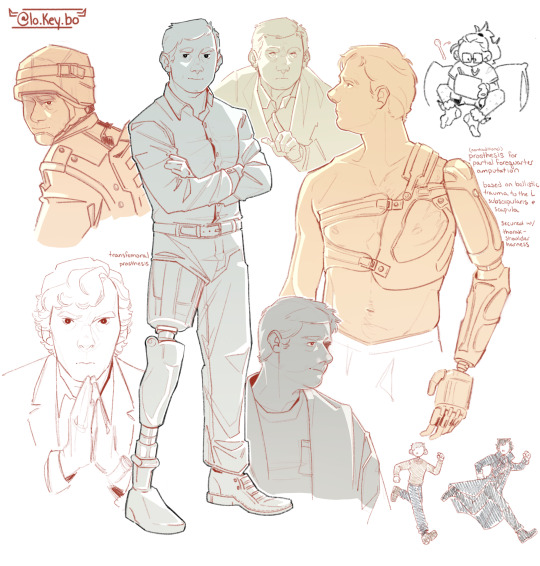
new year, old john watson doodles^^
#was toying with a few concepts because i think there needs to be more disability representation in media#and every adaptation ignoring john watson’s injuries is gettin on my nerves tbh fr#apologies for any errors regarding the prostheses!#i’m still learning and forequarter amputations can be finicky to find accurate information about#my art#the @ is my insta#i’ll learn how to draw him ONE of these days#art#fanart#fanartist#sherlock#bbc sherlock#sherlock bbc#john watson#sherlock holmes#johnlock#gen#martin freeman#benedict cumberbatch#amputee
844 notes
·
View notes
Text
this was genuinely so sweet of Chanse Amber
#as a guy who didn’t really go to high school#chanse asking and then immediately reframing the question for shayne i was like 🥺🥺🥺🥺#and then being like informative and then recognizing angela’s disability in school#just thought it was a nice back to back moment#smosh#video#chanse mccrary#angela giarratana#trevor evarts#shayne topp
177 notes
·
View notes
Text
Do You Know This Disabled Character?
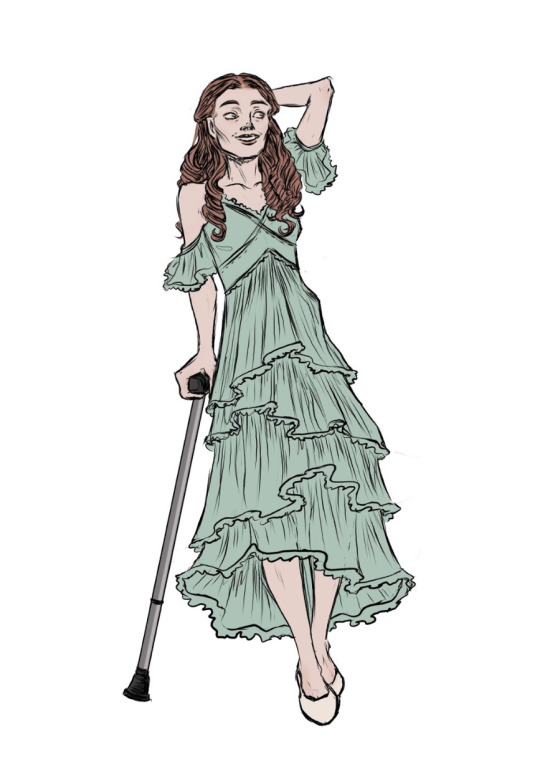
Cytherea Loveday has terminal blood cancer and uses mobility aids.
Art is by @kerosene-art, the post can be found here.
#poll#polls#disability#disabled characters#id in alt text#cytherea loveday#the locked tomb#i have been informed by mod a#to ask y’all to refrain from major spoilers#as mod a is currently reading the series#and is gonna force me to read it next
355 notes
·
View notes
Text
can we just listen to Disabled people when they say what accommodations they need??? Like it really isn’t that hard to just take someone’s word on what is best for their own body! Whether it’s more or less or different than what you deem they need it really isn’t your place to say!!!
Sometimes, people need more than they show! Especially if they’re used to being in pain all the time, then they won’t always display that discomfort.
Sometimes the accommodations someone needs are different than what you assume. A friend who struggles with noise sensitivity may ask for you to turn on a different type of music, instead of turning it down, and if that is what they express they need you don’t have to say “oh no I can just turn it down!” and ignore them saying that that isn’t necessary because your idea of noise sensitivity is different than their own experiences and needs.
And sometimes people need less than you try to provide! Or simply don’t want that accommodation at the time! And here’s the crazy part: this applies even if what they say to do could hurt them. Obviously this isn’t a rule for every situation*, but for some it absolutely is. If your friend wants to tag along for, say, a hike, and they have joint pain it isn’t your place to add in “oh no but they can’t do [the hike]! They’ll be in pain! We have to do something else to accommodate them!” If that person expressed a desire to go, especially if offered other options prior that wouldn’t hurt them, let them live. Let them do the thing that puts them in pain, because Disabled people don’t always want to be shoved into a little box of safety. Absolutely sometimes they do, and some might always want to, but if they don’t, then let them make their own choices for their body. Just as anyone else does. You go out and get drunk, even if it gives you a hangover. You go skating even if you’re shit at it and scratch up your knees a bunch. Just because someone is Disabled doesn’t mean that they can’t do the same thing and do that fun thing that hurts them.
I don’t know if I’m displaying my point how I want, so here’s my own example: I am allergic to the cold. Anything below 60 degrees (f) I get hives. Any water cooler than a fucking warm shower I get hives. My joints don’t do great when it’s cold out. This does not mean that when I say I want to go swimming, you can say “oh but you can’t you’ll get hives!” Or “no you can’t do that you’ll be in pain!” Because. I know that. I know that. I know my Disability better than anyone else can, and I can ask for accommodations I need. I am not a child to be wrapped in bubble wrap so I don’t get hurt. My body is my body and I can do with it what I want, and face the consequences. Likewise, just because I said I wanted to go swimming doesn’t mean that when I don’t want to go out and muck around in the snow it is anyone’s right to say “oh but you wanted to swim earlier, so obviously it isn’t that bad for you!” Or “oh it’s fine it’s not that cold! Just wear a sweater!” Because at that time I need and want different accommodations and that should be listened to and considered accordingly, as far as it can be in that situation.
Seriously. Just listen to us. We are in our own bodies. We know ourselves. It really isn’t that hard
*a situation where this point would be null is, for example, a situation where the person has been peer pressured into doing something, or one where you know the person well and know that the endurance of pain is a self-harming behavior
#disability#disabled#information#shi rambles#ableism#accommodation#cold urticaria#chronic pain#Like I get that my mom wants the best for me but I really know myself#If I avoided getting hives I’d be avoiding swimming at all. I’d not be having cold drinks or foods. I’d be not going outside#Even if I’m complaining about being in pain it doesnt mean that I don’t want to do the thing. It just means I don’t want to be in pain.#I know that won’t change but it’s not the change that matters it’s the expression of it#idk#actually disabled#ugh I don’t like wiriting that i feel like a fraud cuz im not disabled “enough”#It’s so fucking stupid I hate my brain
316 notes
·
View notes
Text
migraine cheat sheet for folks not sure if they have migraines
A couple cardinal signs for migraines:
pulsating/throbbing
nerve pain-like (tingly, electric, shooting)
aching, especially radiating into the jaw
can be on one side or both sides, in one area or more than one area, or even at the base of the skull, front of forehead, etc
at least one of sound sensitivity, light sensitivity, nausea +/ vomiting, and veritgo (typically- there are subtypes and other headache disorders)
and of course migraine aura (flashing lights, dark spots in vision, etc)
can come in short bursts of 1-30 seconds repeatedly, can last for hours or even weeks, and have different phases with different associated symptoms
Headaches:
don't interfere with work, school, or socializing
mildly annoying
take a lot of effort (weeks of staying up too late, being hungover, etc)
happen infrequently (closer to 1-2 a year)
are not "bad ones" (if you had "regular headaches" and "bad headaches" then it's very likely you have migraines - though personally both headache types turned out to be migraines for me)
happen when you have the flu or another illness as a result and it's clears up by the time you recover from it
do not last 30 min - 72 hours with a clear start, middle, and end phase
don't make you feel wrung out dry afterwards
don't affect you neurologically (fuzzy feeling, slow movements, slurring, feeling exhausted/sleep deprived, feel like you can't rest properly even after taking ibuprofen)
don't respond to sumatriptan or another migraine reliver
you don't dread having a headache
you don't avoid chemicals/harsh scents, chocolate, concerts, or any other migraine triggers
#personal#disability#I saw a similar post but it was unrelated and this stuff was a sidenote so I was like#what if whole post is just information about symptoms#so I did not come up with the idea I just didn't want to make a long post even longer with my additions that would kind of derail it
304 notes
·
View notes
Text
there are of course certain posts circulating here that do indeed display the grim state of critical reading and thinking skills on this website. (i'm thinking specifically about the "taylor swift isn't bisexual" "don't worry, op isn't actually saying that taylor swift isn't actually bisexual" post that has been making the rounds for years. op of that reblog chain is probably still fighting for their life, thoughts and prayers, etc.)
then there are posts where there are, in fact, very reasonable and plausible explanations for why a large number of people on the 'neurodivergent with diagnosed and undiagnosed disabilities' website might struggle to understand what they're looking at right away. logic puzzles, jokes that rely on solving math problems in your head to unearth the joke, unreality bits, etc.
and i think it is actually very important to be able to distinguish between these two different types of non-comprehension before deciding to have a go at people for not understanding what they're looking at.
#ray.txt#critical reading and thinking skills are at an all time low and we all know most of the reasons why#but learning disabilities and processing disorders are a different kettle of fish#and while having these diagnoses (or probable diagnoses) means we've been dealt a shittier hand of cards to play#that does not mean we cannot read or think critically#it does mean that some logic puzzles and jokes are not something we can always suss out easily#and if you behave as though that is the same thing as lacking critical reading or thinking skills#i regret to inform you that your beliefs are ableist and you need to sort yourself out
40 notes
·
View notes
Text
seeing disability awareness posts end with “TLDR; no, read it” is fucking WILD
#queerpd.txt#it was about schizophrenia as well#and erm…#👋 has hallucinations that make my digital screens morph and change which makes them hard to read at time#especially big blocks of text… sooo?#schizophrenia#actually delusional#hallucinations#disability#disabled#abliesm#but like yeah there are a lot of disabilities that can make it difficult or even impossible to read large amounts of text#and so tldrs can be REALLY helpful for those people who still want to get the important information in something#bc just cause we struggle to read doesn’t mean we don’t deserve education and information#so it’s just wild to me. to act like someone’s evil. for wanting to check a tldr#like you can just not include it if you really don’t want to write it. you don’t have to also be an asshole#+ it’s helpful for those of us who struggle to process every detail in things#a lot of the time i will read a whole post AND the tldr bc it helps me understand exactly what is being discussed better
125 notes
·
View notes